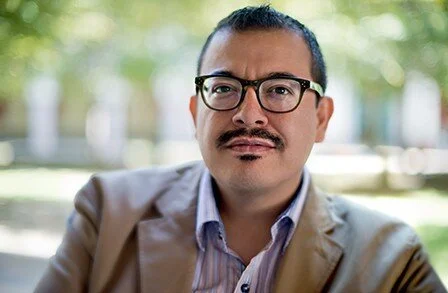
A Wolf in the desert
Book Review: Guillotine by Eduardo C. Corral
by Svetlana Litvinchuk
September 30, 2024
Structured a bit like an indie documentary, Guillotine pulls us along a vast and unforgiving landscape on a dark journey marked by spiritual and physical suffering, bringing us to face the literal and symbolic scorpions and wolves of the Sonoran Desert. Corral’s poetry is itself a wolf: we don’t know where it sleeps at night, but we are simultaneously pulled in and pushed away by the danger of its quest for survival. Slinking in and out of view, the sightings offered to us by themes poems are merely glimpses, elusive and disjointed. This book bites in and doesn’t let go with its ultra intimate themes of the corporeal; of the conflicting pain and pleasure the body can experience.
In his second collection, Corral makes us swim through black water with him as he shows us countless atrocities, daring us not to flinch. The tone is one of internal monologue as he explores the lust and violence of sex as the collection unfolds into a meditation on life as a gay Hispanic man grappling with rejection and his own destructive self-loathing. But deeper than that, his pieces move us outward from a conflicted personal world to imagined narratives that depict the structural violence endured by migrants traversing the desert to cross the US-Mexico border, many of whom perish in namelessness along the way.
This collection gives shape to the sociopolitical, as he paints portraits of the internalized racism and homophobia fostered by a Catholic childhood intersecting with a life spent in a country he believes would prefer him dead on the basis of his skin tone. The disparaging nature of Corral’s self-talk and the startling imagery in his poems give readers a glimpse into a sense of shame and deep-seated inadequacy that are as much individual as they are socially contextualized. The code-switching from English to Spanish, with some poems entirely in Spanish, creates a narrator’s voice that illuminates the intermingling of factors that complicate immigrant identities while the vignettes humanize the dangers of migration.
These poems, which are mostly short, graphic, and experimental, are packed with themes of sexual violence, human trafficking, holding cells, torture, abuses of power, and the politics of speaking one’s native language all while reminding us that “Spanish is a colonial tongue.” Along the way we see clashes of pain and lust, queerness and desire, and rejection and abuse by lovers. It is especially poignant that of all the disturbing themes explored here, he cringes the hardest at his own reflection in the mirror when discussing themes of his weight and sexual identity– an example of the toll these conflicting imaginaries take on our sense of self and showing us how “a wound is a self/reporting instrument.”
This collection is at once violent and sensitive. It isn’t afraid to call summer a puta. It paints the sky “Walmart blue” to indicate the economics that stand to gain something from the continued inequity characterizing the struggle for a better life on either side of the border. Periodic mentions of Coca-Cola and Nike serve as reminders that this image of a cruel hellscape is a product of the exploitation created by policies perpetuated by corporations and The State.
This is echoed in the poem, “Around Every Circle Another Can Be Drawn,” when Corral says:
“what a saint said about God
I believe about loneliness
a circle
whose center is
everywhere
& its circumference is nowhere.”
But in these imagined brutalities there is the element of a non-fiction we’d rather not see in the realities of violence committed every day in both the privacy of the bedroom and in the wide-open desert. Guillotine forces us to examine how we translate and exploit immigration policies into perpetuations of injustice, while urging us not to look away. This collection dares us to ask: How do we exploit, for profit or power, vulnerable bodies and how does structural violence find its way into the everyday?
This collection is as haunting as the Sonoran Desert itself, with its horrifying images of what— and who— is discarded and found there. Constructed from poems that economize words for maximum impact, this book subverts mainstream expectations of the boundaries of poetry that can be read as a commentary on the godlessness of borders. In this way, Guillotine exists in conversation with the claim that poetry is an apolitical space, by showing us how the personal gets non-consensually fucked by the political every day. In this raw and gritty collection, Corral reminds us that there is no single tool more useful than poetry for conveying the visceral experiences of human suffering. His words haunt the reader into considering what it might mean to move in the direction of creating humane borders and, by extension, a world that is more humane.
Eduardo C. Corral is the son of Mexican immigrants. Graywolf Press published his second book, Guillotine, in 2020. His first book, Slow Lightning, won the Yale Series of Younger Poets competition. His poems have appeared in Ambit, New England Review, The New Republic, Ploughshares, and Poetry. He's the recipient of residencies from the MacDowell Colony, Yaddo and Civitella Ranieri. He's also the recipient of a Whiting Writers' Award, a National Endowment for the Arts Fellowship, the Hodder Fellowship and the National Holmes Poetry Prize, both from Princeton University. He teaches in the MFA program in Creative Writing at Washington University in St. Louis.


